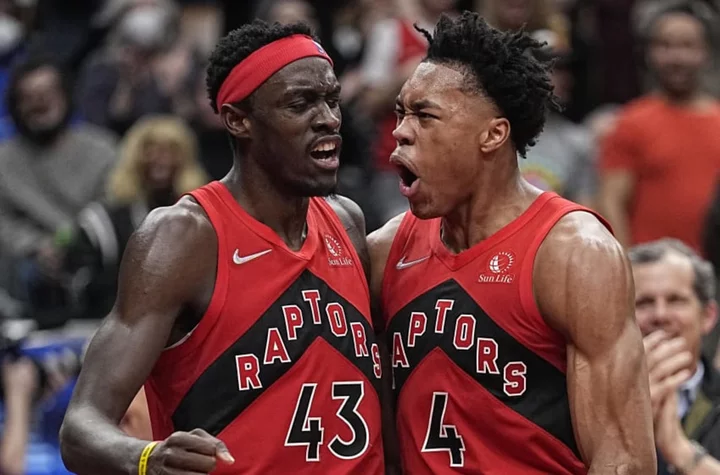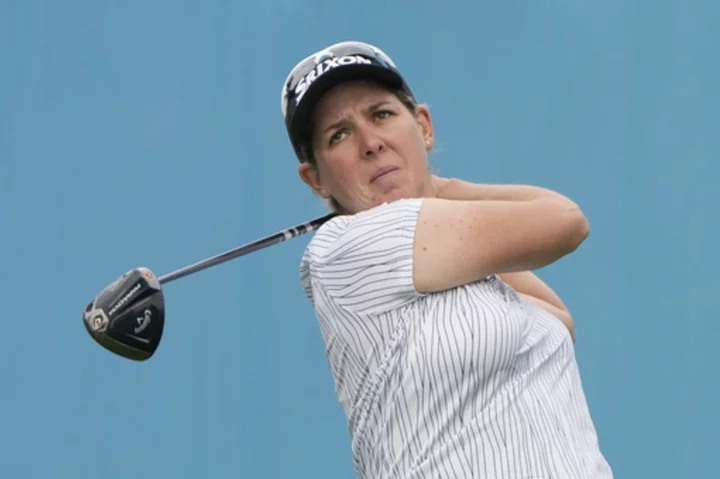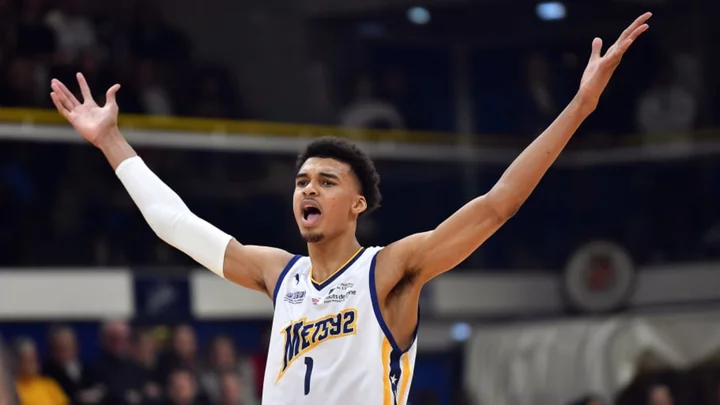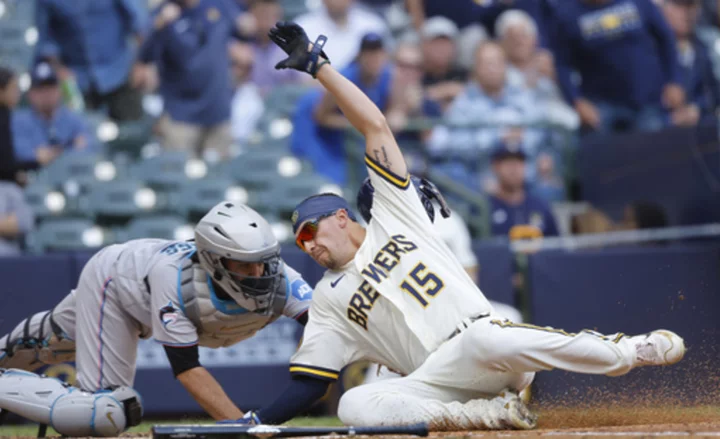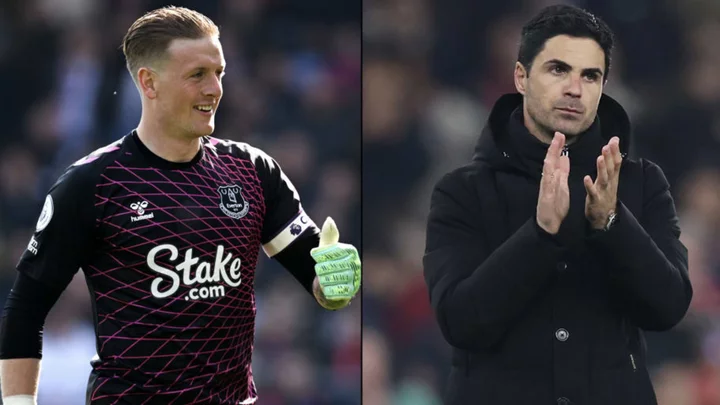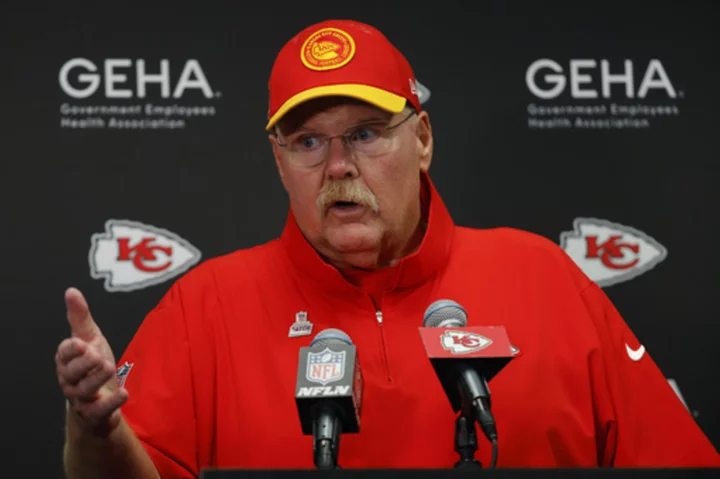The Toronto Raptors' dreadful season ended with a play-in loss to the Chicago Bulls. Masai Ujiri rightly garnered a lot of praise for his construction of the Raptors' championship roster in 2019, but the years since have been largely defined by early postseason exits and bitter disappointment.
Toronto is fast approaching an organizational crossroads. Fred VanVleet walked in free agency, which comes on the heels of Kyle Lowry also walking in free agency. Both could have been traded for real assets, but the Raptors gambled and lost.
Pascal Siakam is next in line. He has been the franchise's best player since Kawhi Leonard's departure. Lowry and VanVleet were both past their primes to a certain degree. Siakam is coming off his most productive individual season to date. At 29 years old, he should have more star-level basketball left in the tank.
How the Raptors handle Siakam's future will determine the direction of the franchise. If he's traded for draft picks and young talent, then it signals at long-overdue admission of defeat. The Raptors need to reset and retool. The current group simply isn't good enough. If Siakam is re-signed, however, the Raptors will attempt (probably in vain) to compete for another half-decade.
Ujiri is a shrewd negotiator. He challenges even Daryl Morey for the title of 'guy nobody likes to trade with' because it's always a painstaking process. Ujiri has turned down juicy offers in the past and the Raptors continue to drive a hard bargain for Siakam, from the looks of it. There's a difference between wanting to trade Siakam and actually mustering up the courage to pull the trigger.
For now, the Raptors' roster looks very similar to last season with a few key differences. VanVleet is gone, Gradey Dick joined the team via lottery pick, and Nick Nurse is no longer in the driver's seat. Instead, former Grizzlies assistant Darko Rajakovic will attempt to lead Toronto into a new age.
Here's what he has to work with.
Toronto Raptors starting point guard: Dennis Schroder
The Raptors quickly pivoted to Dennis Schroder once Fred VanVleet signed his mega-deal with Houston. The former Lakers guard signed a two-year, $25.4 million contract to ostensibly take over the starting point guard gig. Nurse and the Raptors have tossed out some atypical lineups in the past, but the dollar amount suggests extreme confidence in Schroder. Rajakovic may not share Nurse's passion for tall-ball either.
Schroder was the Lakers' opening night starter last season but he transitioned to a sixth man role following D'Angelo Russell's trade deadline arrival. He averaged 12.6 points and 4.5 assists with .415/.329/.857 splits in 30.1 minutes. Schroder bumped Russell out of the starting five late in the Denver series.
The simple read on last season is this: Schroder was better than Russell, but age, name, and fluffier counting stats landed Russell a big contract from the Lakers while Schroder was shunted to Toronto. The Raptors probably shouldn't be thrilled with Schroder as the VanVleet replacement, but he's a suitable stopgap who can put points on the board and play both sides of the ball.
Schroder's foremost attribute is his speed. He's a slippery slasher who puts constant pressure on the rim. Even if he's not a great finisher inside, he will collapse the defense and open up opportunities for teammates. His 3-point shot has progressed to the point of respectability and he will defend his position at the point of attack. He's limited by size (6-foot-3, 172 pounds) but the effort is reliable.
Primary backup point guard: Scottie Barnes
Let's get funky! Scottie Barnes spent plenty of time as the nominal point guard last season. The Raptors have a couple other options here, but Barnes is comfortable handling the rock, pushing the tempo, and making an effort to locate teammates. He has a point guard's intuition and he can defend all across the perimeter, unlocking some intriguing defensive possibilities for Rajakovic's squad.
Other players who could receive minutes at point guard: Malachi Flynn, Markquis Nowell
Toronto Raptors starting shooting guard: O.G. Anunoby
There was a point last season where it felt like O.G. Anunoby might win Defensive Player of the Year. He would have to settle for steals champion and second team All-Defense, but the Raptors' swingman absolutely cemented his status as one of the league's premier perimeter defenders. He did that while putting together the best offensive season of his career, too.
Anunoby averaged 16.8 points, 5.0 rebounds, and 1.9 steals on .476/.387/.838 splits in 35.6 minutes. Teams were rumored to be offering up to three first-round picks for Anunoby at the trade deadline, but the Raptors declined. The 26-year-old is considered part of Toronto's core. That factor undeniably contributes to the Siakam trade rumors. Anunoby is a free agent next summer; a Siakam trade would increase Anunoby's role and, perhaps, his desire to stay.
He is well set up for another leap in production. The 3-point shot is falling more than ever and Anunoby puts his strength to excellent use as a slasher. He operates patiently in the mid-range game, where it can often feel like he picked up a few tips from Kawhi back in 2019, and he can plow through defenders for finishes at the rim. Anunoby shows good awareness off the ball, too. Barnes and Siakam frequently locate him on backdoor cuts or when he's filling the lane in transition.
At 6-foot-7, Anunoby can competently guard one through four. He is Toronto's best on-ball defender and he will get tasked with all the tough matchups, from Giannis Antetokounmpo to Donovan Mitchell. Anunoby gets low at the point of attack and is never bumped off his spot. His 7-foot-2 wingspan was all too frequently on the receiving end of opposing passes last season. He's a deflection magnet, a brick wall, a complete spatial void. Anunoby's defense is special to behold.
Primary backup shooting guard: Gary Trent Jr.
The Raptors moved Gary Trent Jr. to the second unit after the Jakob Poeltl trade. He's probably overqualified for the sixth man role, but all the best sixth men are. Trent averaged 17.4 points on .433/.369/.839 splits in 32.1 minutes last season. He doesn't offer much as a rebounder or passer, but Trent takes a lot of 3s and defends his position well. That alone makes him essential to the current iteration of the Raptors.
Volume and efficiency from 3-point range has been a huge struggle for this Toronto team. Trent can get tunnel vision at times, but the Raptors surround him with multiple quality passers in every lineup. Trent isn't the biggest wing at 6-foot-5, but he's strong and he defends with an edge. He's capable of going off-script and delivering more than 3-and-D, but that is the basis of Trent's appeal for the Raptors.
Other players who could receive minutes at shooting guard: Gradey Dick, Scottie Barnes, Dennis Schroder
Toronto Raptors starting small forward: Scottie Barnes
Scottie Barnes actually regressed in a few key areas after his Rookie of the Year campaign, but the former No. 4 pick's sophomore season was an overall success. No, the Raptors couldn't win games, but Barnes' playmaking took a step forward and he established his presence as a lineup pillar, both offensively and defensively.
New head coach Rajakovic is known for his offensive creativity and schematic mind. There aren't many more unique offensive engines than Scottie Barnes. He will regularly bring the ball up and initiate the offense at 6-foot-8. He's mostly a non-entity behind the 3-point line (28.1 percent on 2.9 attempts), but Barnes is a strong-bodied slasher with a knack for making the extra pass.
Barnes loves to face up from the elbow, where he can survey the defense for cutters and shooters or attack straight down the middle. Barnes' efficiency dipped slightly last season, but some of that was experimental — more mid-range jumpers, higher-difficulty attempts — and some of it was the Raptors' overall offensive regression, which went far beyond Barnes' individual woes.
On the defensive end, Barnes is a central figure in what the Raptors are building. Toronto has one of the best defensive rosters in the NBA on paper. Barnes can struggle a bit with quicker guards in space, but he's a genuine four or five-position defender with sticky hands (1.1 steals) and a presence on the glass.
Primary backup small forward: Gradey Dick
The Raptors selected Gradey Dick with the No. 13 pick in June's NBA Draft. It was the perfect marriage of prospect and team. Dick adheres to a lot of Toronto's roster-building hallmarks (tall, skilled, quality defender) but above all else, he's an elite 3-point shooter. His volume and shot versatility is going to be a significant boon for the Raptors' offense.
Dick will thrive running of screens and working DHOs with Barnes, Siakam, and the like. He's not a point guard, but Dick does possess advanced passing instincts and the ability to sling some beautiful skip passes on the move. He's slender and he's not the most dynamic athlete, but Dick's size and hustle generally makes up that ground on defense. He's always in the right spot with active hands and a competitive spirit.
He's only 19 years old, but Dick has the feel of a four-year college vet who understands the ins and outs of basketball on a deep level. He's not the highest-upside prospect, but his floor is higher than most and he's going to be an immediate contributor for the Raptors — whether the goal is to win or to rebuild.
Other players who could receive minutes at small forward: Jalen McDaniels, O.G. Anunoby, Chris Boucher, Otto Porter Jr., Garrett Temple
The Raptors stole Jalen McDaniels from the Sixers in free agency. As far as two-year, $9.3 million contracts go, there's a fair amount of upside here. He's 6-foot-9 with the ability to guard all over the floor and hit the occasional 3. He's also young — 25 years old — will untapped upside as a slasher.
There's little downside risk relative to the contract, and there's natural talent and athleticism that the right team and development staff could tap into. Expect him to play.
Toronto Raptors starting power forward: Pascal Siakam
The Raptors are probably right to consider Pascal Siakam trades, but every move the front office made this summer — trying hard to re-sign VanVleet, paying Schroder, re-signing Poeltl — suggests a continuing desire to win basketball games. Siakam reportedly wants to stay in Toronto long term, so there's not even immediate pressure on the franchise to strike a deal.
Siakam can still help the Raptors win games. His play style has been the butt of jokes in the past, but for every fruitless spin move there's an impressive pirouetting finish that few 6-foot-9 forwards are capable of. Siakam is a genuine three-level threat, complete with remarkable downhill speed and body control.
Last season was the best of Siakam's career to date. He averaged 24.9 points, 7.8 rebounds, and 5.8 assists on .480/.324/.774 splits in 37.4 minutes. He led the NBA in minutes per game for a second straight season but still appeared in 71 games. Siakam's approach involves a delicate balance between finesse and brute force. He's not the strongest forward, but he works up a lot of momentum driving the lane and understands when to toggle between evasive maneuvers and simple physical finishing at the rim.
His progress as a passer has been particularly impressive. Siakam is a legitimate playmaking hub for the Raptors offense. He can bring the ball up the court, run inverted pick-and-rolls, and leverage his gravity as a slasher to find open teammates on the perimeter. Add in the quality defense, and Siakam is quietly one of the most well-rounded stars in the NBA. The Raptors can't settle for pennies on the dollar, even if Siakam's exit is the right next step.
Primary backup power forward: Chris Boucher
Chris Boucher has been the ultimate Raptors role player since his arrival in 2017. A springy, spindly 6-foot-9 forward out of Oregon, Boucher has been plugged into all sorts of different lineups. He has played center, he has been a standard power forward, and he has spent time as a wing in Nurse's jumbo-sized, 'everybody is 6-foot-8 or taller' lineups.
The numbers remain steadfast every year. Boucher loves to run the floor and make himself available for finishes at the rim. He's an okay shooter from distance with enough fluidity of movement to attack errant closeouts on straight-line drives. He averaged 9.4 points and 5.5 rebounds on .493/.328/.762 splits in 20.0 minutes last season.
Other players who could receive minutes at power forward: Scottie Barnes, O.G. Anunoby, Jalen McDaniels, Otto Porter Jr.
Toronto Raptors starting center: Jakob Poeltl
Toronto moved legitimate draft capital to acquire Jakob Poeltl at the trade deadline. It didn't have the intended effect — Toronto still finished the season .500 and well outside the contenders circle — but Poeltl's arrival was not devoid of impact. He's one of the most reliable paint protectors in the league, standing 7-foot-1 and 245 pounds. The Raptors were long during the Nurse era, but the team lacked a physical body in the post following Marc Gasol's departure. Poeltl helped fill the void.
His numbers don't leap off the page, but Poeltl is one of the best in the league at his specific role. He's a drop coverage defender who covers a lot of ground near the basket. He doesn't explode vertically for blocks, but he's consistently in the right place and he's tall enough to get his hands on a fair number of shots (1.3 blocks per game). He also inhales rebounds, using his wide frame to seal potential board thieves out of the restricted area.
On the offensive end, Poeltl does his very simple job at a very high level. He sets thundering screens and uses his deft touch and brawny power to finish efficiently around the basket. Poeltl doesn't exactly profile as a playmaker, but he is a solid passer for his position too. He makes quick reads on the roll and he can find cutters operating out of the occasional post-up.
Last season, Poeltl averaged 13.1 points, 9.1 rebounds, and 1.3 blocks in 27.2 minutes with the Raptors. He started 25 of 26 appearances and cemented his presence as the full-time five, which earned him a new four-year, $80 million contract. That's a big number but it's in line with Poeltl's profound defensive impact. He doesn't address the roster's offensive shortcomings — in some ways, he compounds them — but Poeltl should continue to play a central role.
Primary backup center: Precious Achiuwa
Precious Achiuwa is another Raptors role player who aligns perfectly with the Masai Ujiri roster-building formula. He's 6-foot-8 and 225 pounds with the abiltiy to guard the perimeter on defense. While Poeltl anchors the paint, Achiuwa offers Toronto the ability to switch and contain more high-octane offenses when the need arises.
The Raptors' defense, on paper, is quite formidable. Poeltl basically ensures quality rim protection. In the non-Poeltl minutes, Achiuwa will share the floor with players like Siakam, Barnes, Anunoby, and Boucher — all of whom can handle physical battles in the post or guard the perimeter, to varying degrees.
The offense with Achiuwa has always been a mixed bag. He's shot 26.9 percent on 2.0 attempts per game from 3-point range last season. The volume and consistency isn't there, but he's liable for the occasional red-hot afternoon. He leverages what little shooting threat he can muster to drive the lane and use his athleticism to finish around the rim.
Achiuwa doesn't offer much as a passer, but he averaged 9.2 points and 6.0 rebounds on .485/.269/.702 splits in 20.7 minutes last season.
Other players who could receive minutes at center: Pascal Siakam, Chris Boucher, Christian Koloko, Scottie Barnes
Christian Koloko played 53 games (19 starts) as a second-round rookie out of Arizona. He was extremely raw, but the 23-year-old showed great promise as a mobile 7-foot-1 rim protector and lob threat. He's in line to take Achiuwa's job if the latter's efficiency doesn't improve.

